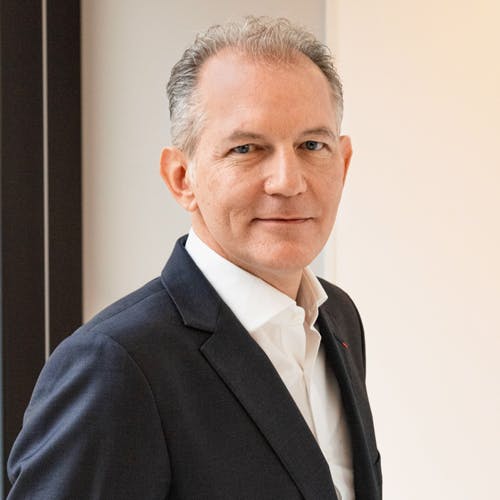
François Jackow joined the Group in 1993 and has held a wide range of responsibilities throughout his international career. In 2002, he was in charge of Innovation, before being appointed Chairman and CEO of Air Liquide Japan in 2007, then Group Vice President of the Large Industries business line in 2011. In 2014, he joined the Executive Committee and was appointed the Group’s Vice President of Strategy. In 2019, he became Executive Vice President, notably supervising the Europe Industries, Europe Healthcare and Africa/Middle East/India hubs. François Jackow is French and has a scientific and managerial education, having studied in France and the United States. A graduate of the Paris-based École Normale Supérieure, he also holds a Master’s degree in Chemistry from Harvard University in the United States and an MBA from the Collège des Ingénieurs.
In March 2021, Air Liquide announced ambitious sustainable development objectives. What has that changed for the Group ?
These objectives represent an in-depth evolution of our business model. Our performance must not only take into account the interests of our employees, customers and shareholders, but also those of society as a whole. With these objectives, we have set out a very clear road map in terms of sustainable development. The Group is focused on global performance, which combines financial and extra-financial performance and now includes environmental, social and governance indicators.
Decarbonization is a key focus of your commitments. What are the key drivers in this field ?
In practical terms, we have targeted two major areas of action to fight global warming. The first is to decarbonize industry. We are a leading player in this pursuit thanks to our wide range of technologies based on hydrogen, carbon capture and storage and biomethane. We implement these solutions for our customers, allowing them to significantly reduce their CO2 emissions. We are also working to decarbonize our own operations through numerous initiatives, from the purchase of renewable energy - as we’ve done in the Netherlands and in Belgium -to the construction of more energy-efficient production plants that emit less CO2. Our goal is to reduce our CO2 emissions by 33% by 2035 and to become carbon neutral by 2050. Our second area of action is closely linked to the first, and is of course hydrogen, a major lever of the energy transition.
In terms of hydrogen, what are your major accomplishments ?
There are so many, and we are extremely proud of them. These days, many companies are interested in hydrogen and its adoption is rapidly gaining momentum in the industrial and heavy transport sectors. We have already signed several partnerships with major global industrial brands in these domains, a sign of how our technologies have reached maturity. In the past four years, we have multiplied our annual expenditure on hydrogen technologies by a factor of 20, and the number of our employees working in this field has increased tenfold. And this is just the beginning; the outlook is extremely promising. By 2035, we will invest 8 billion euros in the low-carbon hydrogen value chain, with the goal of tripling sales from 2 billion to 6 billion euros in the same time frame.
